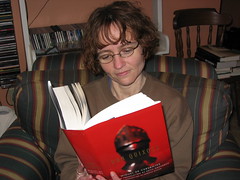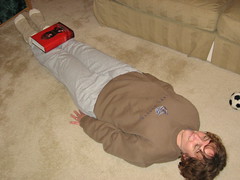I'm really excited to bring you something I've never had before at So Many Books, an author interview. I had the pleasure of interviewing first time author Adam Fawer. Mr. Fawer's book, Improbable was just published in February by HarperCollins. Improbable is a fast paced thriller that involves probability theory, quantum physics, Jungian psychology, mad scientists, a rogue CIA agent, epilepsy, schizophrenia and a mean game of Texas hold 'em.
So Many Books: You have had an impressive and successful career in business, an MBA from Stanford, positions at Sony Music, J.P. Morgan, and COO at About.com, what made you decide to turn novelist?
Adam Fawer: Even though I've always enjoyed the business world, ever since I was a kid, I wanted to be a novelist. However, like most dreams, I let it go when I graduated college, I got my first job and "became an adult." For the next ten years, I traveled the straight and narrow path (First Job => Better Job => Business school => Best Job). But after the dot-com crash, I spent most of my days at About.com figuring out which person to lay off next and suddenly my job didn't seem like fun anymore.
Then my good friend Stephanie Williams called me with some news-- that changed my life forever. Sshe had been diagnosed with terminal breast cancer. This isn't something you expect to hear from an old college friend (especially one who's since she was only 30 years old). The news hit me hard and really made me reevaluate my life. Sounds corny, I know, but it's true. My father had died of cancer when he was only 49 after working a job he hated for almost twenty years. I didn't want this to be my fate. Suddenly I had an incredible sense of urgency to stop messing around and do what I wanted to instead of what I was supposed to. So, I quite my job.
As Stephanie had also always wanted to write a novel (she was an award-winning magazine writer), she and I made a pact. We would write together every day until we both had a completed manuscript. The next day, I took the subway to where she lived in Brooklyn Heights, headed out to Starbucks, (our respective laptops carefully tucked beneath our arms), plugged in and began writing.
We wrote for almost two hours that day. And the next day. And the day after that. That first month, I don't think we missed a single day. Then Stephanie got sicker and had to go into the hospital, but I kept going writing. And when Stephanie was feeling better, so did she.
It took me over a year, before I had a manuscript good enough to sell but then in October 2003 I sold HarperCollins bought the English rights to my novel, IMPROBABLE, to HarperCollins. Stephanie went a different route and sold her novel to a colleague who was starting a new imprint. On June 21, 2004, I (along with about 100 others) attended Stephanie's book party. She said it was the happiest day of her life. Two weeks later, she finally lost her battle with cancer.
Stephanie helped show me how important it is to do what you love because you never know how much time you have left. Now, I'm a full-time writer.
And that's how I decided to turn novelist.
SMB: That is a heartbreaking and inspirational story. You must miss Stephanie very much.
Has your writing routine changed, or do you still write for two hours every day in a cafe?
AF: During the “creation” phase, I still usually write for two- hour stretches, as if I attempt anything more and my brain begins to fry. However, once I enter the editing phase I sometimes work for ten hours at a time. Even though editing is tedious, exhaustive work, I find that it’s best if I push through the pain, so-to-speak. Also, going through a large volume of text helps me make my the story flow better.
SMB: In Improbable you have a main character with epilepsy who plays poker and can run the probabilities better than a calculator. You've also got schizophrenia, an ambitious scientist, and espionage. What sort of research did you have to do and how did you go about it?
AF: Depends which topic. I knew a lot about poker and probabilities before I started writing. On the poker side, I’ve been an avid player since I was a teenager and played a regular game of Hold ‘Em every week during business school. As for the probabilyies, I have a master’s in statistics, which obviously helped a lot gave me the foundation to right about probability.
The other topics required a bit more research. Everything I learned about schizophrenia I picked up either from the internet or from books at Barnes & Noble (whenever I was stuck, I’d go to the B&N café with a pile of books, read through them, take notes and then put them back on the shelves). The espionage stuff I picked up from watching TV and movies for about 30 years ;) Also, I an old high school friend (now a college professor) helped me out with a lot of the physics in the book.
SMB: On M.J. Rose's Backstory website, you mention an eye illness when you were a kid and that you discovered reading through listening to books on tape from the Commission for the Blind. Do you still listen to books on tape?
AF: No. My vision is much better now than when I was a kid and I really enjoy looking at the words on the printed page, feeling the book in my hand. For so long I wanted to be able to read just like everyone else, so now that I can, reading is my first choice. However, I do listen to a TON of NPR—there is something about listening to a story that I’ll always enjoy.
SMB: Improbable is your first published novel, is it the first book you have actually written or do you have one or two aborted attempts hiding in drawers? Before Improbable had you published anything else (articles, stories, etc.)?
AF: The first book I ever wrote was titled THE IMPROBABLES. It was good enough to get me an agent, but not good enough to get published. My agent suggested some ways to make it better and I agreed. At first I thought I’d just tweak it a little bit here and a little bit there, but five months later I found that I had thrown out about 70% of the original and rewritten it from the ground up. Hence, even though technically IMPROBABLE is the second draft of THE IMPROBABLES, I consider it my second book because it’s so different.
Before this novel, the only other place I was published was in BusinessWeek in the form of (I had written an angry letter to the editor).
SMB: In Improbable the plot moves between so many characters and so many different view points and never once gets confusing. How did you manage to keep track of everything?
AF: Well, because I have a business background, I’m used to using Microsoft Excel to create budgets, timelines, etc. So, when I started writing my book, I created a spreadsheet that kept track of every scene, which character’s POV it was written in and how many words each scene contained. That way, when I went back to edit, it was easy for me to see a comprehensive outline of the book. Then I used that outline to plot out the action, to make sure that the reader didn’t spend too much (or too little) time with any character before jumping back to another character.
SMB: In the book you have one of your characters, Dr. Tversky, say that science used to be revolutionary, that the "poor geniuses working out of their basements around the clock" had vision and "courage in their vision" but now science is stuck in bureaucracy. Do you think this characterizes the state of science today? Or do you think there are still plenty of geniuses working in their basements?
AF: Nowadays science is so specialized and scientists use such expensive equipment that I think it’s hard to simply "work in your basement." However, tThat being said, just because even though much of science is being done by the government and large bureaucratic pharmaceutical companies, there are many small, venture-backed biotech firms that embody the classic idea of geniuses working in their basements. Still, I’d guess that the majority of advancements come from the bigger guys.
SMB: You do a great job at explaining probability and quantum mechanics in your book; never once do you make the reader feel stupid. You also manage to explain some complex ideas without slowing down the plot. I must say that your explanation of Schrodinger's cat is one of the best I've come across in fiction. If someone who reads your book becomes more interested in finding out more about probability theory or quantum physics, can you recommend a place to start?
AF: That’s a tough question. My foundation in probability comes from my undergraduate and graduate education at The University of Pennsylvania. However, I did brush up a bit while writing the book (and I have ZERO background in physics). I’d say the best place to start is the Internet. There are a lots of sites out there run by enthusiasts that explain complex phenomenon in nice, easy to understand language. Just type the theory that interests you into a Google search box and odds are you’ll find what you’re looking for within the first ten results.
SMB: Your book has been translated into five languages already. Did you work closely with the translators, and if so what was that like?
AF: Although my agent has sold the translation rights in seven languages (French, Italian, German, Polish, Japanese, Dutch and Spanish) so far it’s only been translated into three, as many of the foreign publishers aren’t releasing the book until next fall. Each experience I had with the foreign publishers was different. The Dutch publisher didn’t ask me anything—they just took the final manuscript and translated it (and they also renamed it—in Holland, my book is called DE EINSTEIN CODE, I swear to God). The Italians asked me lots of questions about the numbers, but not much more than that. The French translator was by far the most diligent. She would email me pages of questions about idioms and terminology. It was a very interesting process, as I never realized how much slang I used until I had to explain it all.
SMB: The actual look of Improbable is quite pleasing, I love the font and am a person who misses publishers printing information about the font in the back of the book. Did you get to have a hand in the way the book looks, or did you leave it all to the "experts"?
AF: I had a hand in designing the cover, although my influence was small. Basically HarperCollins came up with a concept and designed the cover themselves. When they presented it to me, it was very similar to how it looks now, except that the color scheme was different—lots of yellows and browns. My agent and I agreed that it should have more color, so they changed the primary color to green, printed the title in orange, my name in white and kept the yellow just for the lines of probability that scroll across the cover. As for the typeface inside, I think they did a great job but I’d be lying if I said I had anything to do with it.
SMB: I played the game on your book site, www.Improbablebook.com, and lost a chunk of change with a king high flush. Walter had an Ace high. I had this weird moment of deja vu déjà vu since all of Caine's troubles in the book start with him losing to Walter's highly improbable Rroyal straight flush. Is the game programmed to do that or was it just a coincidence? And speaking of the game, did you design it yourself?
AF: I wrote all of the text in the game and designed all of the challenges, but a professional flash programmer implemented my vision. And there is a way to beat Walter, but I won't tell you how ;)
SMB: Is there going to be Improbable, The Movie?
AF: I certainly hope so. My literary agent found I have a film agent that loved my book and he is currently speaking to the interested parties. I know there have been lots of inquiries but thus far no formal offer has been presented to me. We’ll see how it goes.
SMB: Your book jacket says you have too many pet fish, what kind of fish do you have and how many is too many?
AF: Ha, ha, ha. Actually, when I wrote that I had many more than I have now. I had a brackish fish tank with a mono, a scat, a shark and a cichlid, while my fiancée had a larger tank with five goldfish, a couple algae eaters and a koi. However, when we moved in together, we decided that our place was only big enough for one tank, so I gave my fish to a kindly man in my local pet store.
SMB: Have you begun working on a new book and if so, can you give any hints on what it might be about?
AF: I’ve completed the first draft of my next book, but I haven’t had much time to write lately as I now have a seven-week-old son (it’s been a busy year). My book (as yet untitled) is another thriller. This one is about Gnosticism, emotions, synethesia, cults and music. I’m very excited about it and can’t wait to get back to writing.
SMB: A big thank you to Mr. Fawer for taking the time to do this interview. If you'd like to read an excerpt from Improbable, play the Improbable challenge and maybe win a trip to Las Vegas, visit http://improbablebook.com/. You can also sign up for email updates on Adam Fawer's literary doings.
 The Body
After you have exercised your mind it is time to move your body around.
Bicep Curls.
Every knight errant worth his salt needs strong arms to lift his sword and lance. Maidens in distress are not exempt either. Maidens need strong arms to fend off attacks on their honor until a good knight can come and rescue them. So, take DQ in hand, be sure to keep your wrist straight and bend your arm from the elbow. Repeat 20 times each arm or as many times as you can before your hand goes numb and the book falls to the floor.
The Body
After you have exercised your mind it is time to move your body around.
Bicep Curls.
Every knight errant worth his salt needs strong arms to lift his sword and lance. Maidens in distress are not exempt either. Maidens need strong arms to fend off attacks on their honor until a good knight can come and rescue them. So, take DQ in hand, be sure to keep your wrist straight and bend your arm from the elbow. Repeat 20 times each arm or as many times as you can before your hand goes numb and the book falls to the floor.
 Sit Ups
A knight needs to be able to fit into his armor and a lady into her silk gowns. Add something extra to your sit ups by placing DQ on your chest and wrapping your arms around it. Be sure to keep your knees bent. Hook your feet under a chair or sofa to keep yourself from sliding across the floor. Repeat 50 times, 100 if you want that "six-pack" abs look.
Sit Ups
A knight needs to be able to fit into his armor and a lady into her silk gowns. Add something extra to your sit ups by placing DQ on your chest and wrapping your arms around it. Be sure to keep your knees bent. Hook your feet under a chair or sofa to keep yourself from sliding across the floor. Repeat 50 times, 100 if you want that "six-pack" abs look.
 Leg Lifts
Leg lifts are particularly important for maidens who may need to give something or someone a good swift kick in the ---. But knights need strong legs too, armor is heavy and they will not always find themselves sitting on their valiant and noble steeds. Place DQ on your legs between your ankles and your knees, lift your legs up together, hold for a count of 5, then lower. If you find you have trouble keeping DQ on your legs, then using a bungee cord is acceptable. Repeat 20 times
Leg Lifts
Leg lifts are particularly important for maidens who may need to give something or someone a good swift kick in the ---. But knights need strong legs too, armor is heavy and they will not always find themselves sitting on their valiant and noble steeds. Place DQ on your legs between your ankles and your knees, lift your legs up together, hold for a count of 5, then lower. If you find you have trouble keeping DQ on your legs, then using a bungee cord is acceptable. Repeat 20 times
 Push Ups.
Knights need strong shoulders for battle. Maidens need to look attractive in off the shoulder gowns. Both will benefit from push ups. While face down on the floor, place DQ on your upper back. With your hands next to your shoulders, push yourself up until your elbows are nearly straight then lower yourself to just above the floor. If you find your are unable to keep DQ from sliding off your back, first check to see that you are keeping your back straight. if you are sure you are doing the push up correctly and still experience trouble, you can use bungee cords or place DQ in a backpack. Maidens repeat 20 times, knights 50
Push Ups.
Knights need strong shoulders for battle. Maidens need to look attractive in off the shoulder gowns. Both will benefit from push ups. While face down on the floor, place DQ on your upper back. With your hands next to your shoulders, push yourself up until your elbows are nearly straight then lower yourself to just above the floor. If you find your are unable to keep DQ from sliding off your back, first check to see that you are keeping your back straight. if you are sure you are doing the push up correctly and still experience trouble, you can use bungee cords or place DQ in a backpack. Maidens repeat 20 times, knights 50
 Aerobics
Now it is time for the aerobic portion of the workout. Remove the slipcover from DQ and place on a flat, no-skid surface. You can now use DQ for your favorite step aerobic routine. If you want to work out your arms during aerobics, then be sure to avail yourself of a paperback edition of DQ.
Aerobics
Now it is time for the aerobic portion of the workout. Remove the slipcover from DQ and place on a flat, no-skid surface. You can now use DQ for your favorite step aerobic routine. If you want to work out your arms during aerobics, then be sure to avail yourself of a paperback edition of DQ.
 Cool Down Meditation
After you have completed your Don Quixote Mind/Body workout, be sure to spend at least five minutes in cool down meditation. Sit on the floor, legs crossed. It is acceptable to sit on a pillow. To help strengthen your neck and spine during meditation and to help you be more balanced, place DQ on your head. Close your eyes and relax your arms on the tops of your legs. Breath deeply and feel your muscles let go of all the stress of knight errantry and maiden in need.
Cool Down Meditation
After you have completed your Don Quixote Mind/Body workout, be sure to spend at least five minutes in cool down meditation. Sit on the floor, legs crossed. It is acceptable to sit on a pillow. To help strengthen your neck and spine during meditation and to help you be more balanced, place DQ on your head. Close your eyes and relax your arms on the tops of your legs. Breath deeply and feel your muscles let go of all the stress of knight errantry and maiden in need.
 And there you have it, the Don Quixote Mind/Body workout. You'll be slim and trim in no time.
As with all exercise programs, be sure to speak with your physician before beginning.
For those who like a little music with their workouts, may I suggest trying one of these?
And there you have it, the Don Quixote Mind/Body workout. You'll be slim and trim in no time.
As with all exercise programs, be sure to speak with your physician before beginning.
For those who like a little music with their workouts, may I suggest trying one of these? It all began on
It all began on 
